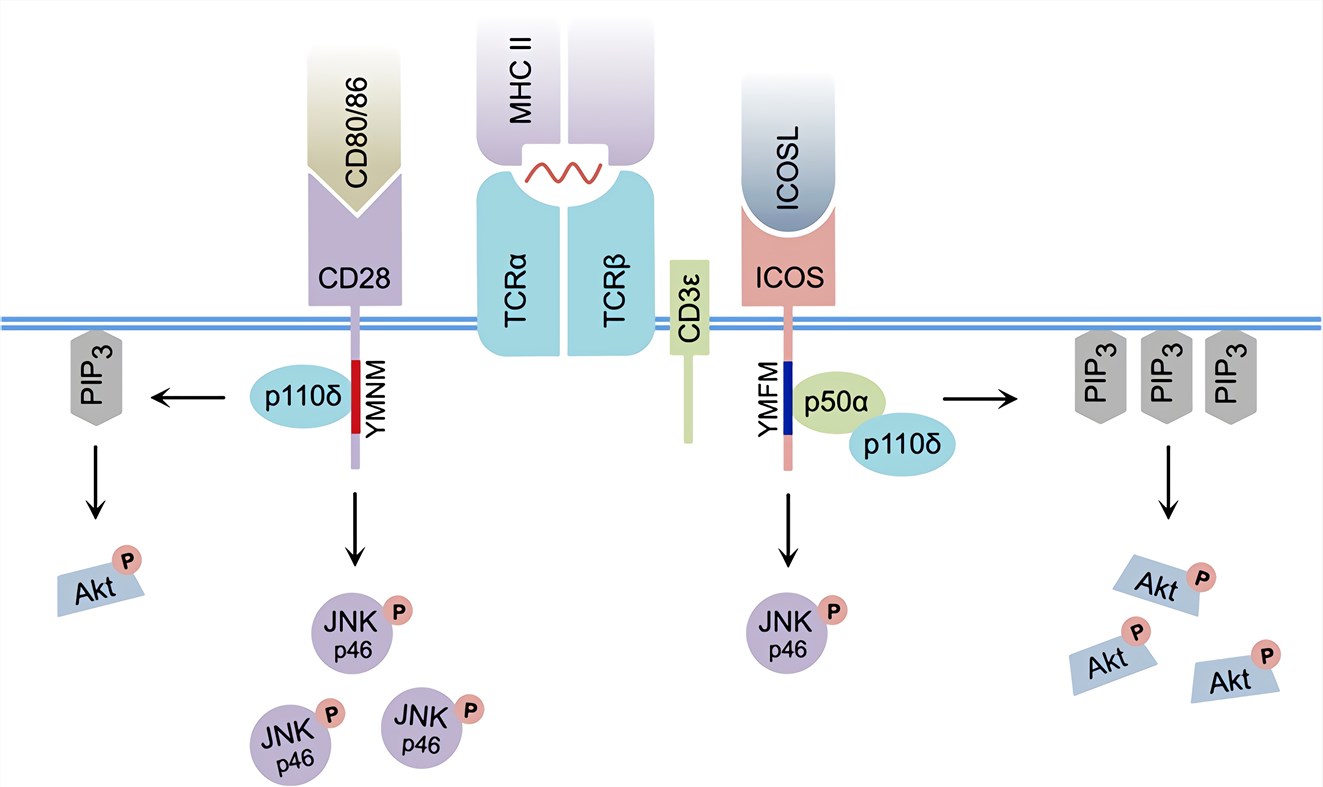Inducible T cell co-stimulator (ICOS, CD278) is an activating costimulatory immune checkpoint expressed on activated T cells. It is a type I transmembrane glycoprotein which belongs to the CD28 family of co-stimulatory immunoreceptors. It is present on the T cell surface as a disulfide bond-linked homo-dimer and is rapidly upregulated upon TCR cross-linking and/or CD28 co-stimulation. Its ligand, ICOSL (also known as CD275, B7RP-1, B7-H2), is mainly expressed by antigen-presenting cells (APCs), dendritic cells (DCs), macrophages, and somatic cells, including tumor cells in the tumor microenvironment. ICOS plays a non-overlapping role in the functional differentiation of T follicular helper cells (Tfh), Th2, and Th17 lymphocytes.
 Fig.1. ICOS signal transduction.1,2
Fig.1. ICOS signal transduction.1,2
ICOS/ICOSL binding generates various activities among the diversity of T cell subpopulations, including T cell activation and effector functions and the sustained suppressive activities mediated by regulatory T cells. This dual role in both antitumor and protumor activities makes targeting the ICOS/ICOSL pathway attractive to enhance anti-tumor immune responses.
The expression of ICOS-positive lymphocytes and ICOSL has been reported in various tumor settings and considered with alternate prognostic valence. The activity of ICOS appears to be linked to T cell activation following CTLA-4 blockage. ICOS stimulation may significantly enhance the immune-stimulatory effect of CTLA-4 blocking antibodies that, conversely, are impaired in ICOS knock-out models.
Current studies support ICOS as a relevant and potentially exploitable marker of T cell activation. Its expression by CD4 and CD8 T lymphocytes after treatments with checkpoint inhibitors may indicate the intended re-activation of the anticancer immune response. It seems to be associated with clinical responses and correlates with prognosis. Currently, the available evidence supports a foreseeable therapeutic scenario wherein ICOS stimulation may be explored more in association with anti-CTLA4 or anti-PD-1 than a single treatment.
The ICOS/ICOSL axis has been proved to promote either antitumor T cell responses or protumor responses when triggered in Tregs. Thus, both agonistic and antagonistic monoclonal antibodies (mAbs) targeting this pathway are being investigated for cancer immunotherapy.
As a worldwide company with extensive scientific expertise, Creative Biolabs guides clients from drug discovery to approval and provides continuity for their entire program. Our highlighted immune checkpoint-related services include immune checkpoint antibody development, immune checkpoint assays, etc. For more services, please refer to our Services Overview for more information. Please do not hesitate to contact us for more details.
References
All listed customized services & products are for research use only, not intended for pharmaceutical, diagnostic, therapeutic, or any in vivo human use.
USA
Tel:
Fax:
Email:
Copyright © 2026 Creative Biolabs. All Rights Reserved.